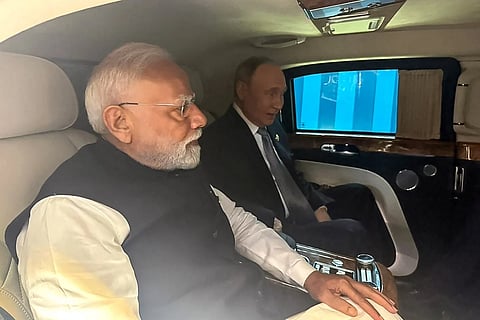

Prime Minister Narendra Modi told Russian President Vladimir Putin on Monday that the two countries should deepen cooperation “in all sectors”.
The remark was a strong indication that New Delhi would not cut back on crude oil imports from Russia despite pressure from the US, The South China Morning Post said in a report from Tianjin, China.
Modi also expressed strong enthusiasm for welcoming Putin to India, in a subtle rebuke of US President Donald Trump. Meeting on the sidelines of the Shanghai Cooperation Organisation (SCO) summit in Tianjin, Modi told Putin: “1.4 billion Indians are eagerly waiting for you.”
In a social media post minutes after what he described as an “excellent” meeting, Modi said: “Discussed ways to deepen bilateral cooperation in all sectors, including trade, fertilisers, space, security and culture.”
Trump has reportedly cancelled plans to visit India later this year. His decision follows New Delhi’s refusal to stop purchases of discounted Russian oil, which prompted Washington to double trade tariffs and sent bilateral ties to an all-time low.
Putin, meanwhile, is expected to visit India in December for the latest annual bilateral summit. The mechanism of regular dialogue between the Indian and Russian leaders was established in 2000, with the previous edition held in July last year in Moscow.
“Even in the most difficult circumstances, India and Russia have always stood shoulder to shoulder,” Modi said.
Putin also praised the “multifaceted” Russia-India relationship, describing it as “actively developing”.
The meeting comes as India and the United States grapple with trade tensions and a diplomatic row, while New Delhi’s growing partnership with Moscow draws close scrutiny from the White House.
The US implemented a 50 percent tariff on Indian imports starting last Wednesday, framing it as a penalty for India’s continued purchase of Russian crude, which remains under a broad range of Western sanctions due to Russia’s invasion of Ukraine.
India is among the biggest buyers of oil from Russia, the world’s No. 2 exporter after Saudi Arabia.
India would “neither bow down nor ever appear weak”, Trade Minister Piyush Goyal said on Friday, adding that New Delhi would instead focus on ways to “capture new markets”.
According to a New York Times report on Saturday, Modi’s refusal to endorse Trump’s pursuit of the Nobel Peace Prize played an “outsize” role in souring relations between the two nations.
The report, citing people familiar with the US president’s schedule, added that Trump no longer planned to visit India in the autumn for the Quad summit. The leaders of the two other member states, Japan and Australia, are expected to attend.
Four days earlier, Germany’s Frankfurter Allgemeine Zeitung reported that Modi had declined to talk to Trump on the phone multiple times in recent weeks.
After the morning session at the SCO summit, Modi shared photos of himself and Putin travelling together in the same car to their bilateral meeting venue, noting that “conversations with him are always insightful”.
Bound by a shared grievance over Trump’s tariff policies, relations between the world’s two most populous nations warmed noticeably during what was Modi’s first visit to China in seven years.
Xi told Modi that border issues should not be the defining factor in ties between the neighbours when they met for bilateral talks on Sunday, according to state news agency Xinhua.
China-India ties could be “stable and far-reaching” if they saw each other as partners instead of rivals, Xi added.